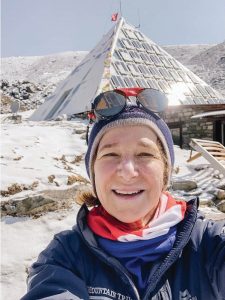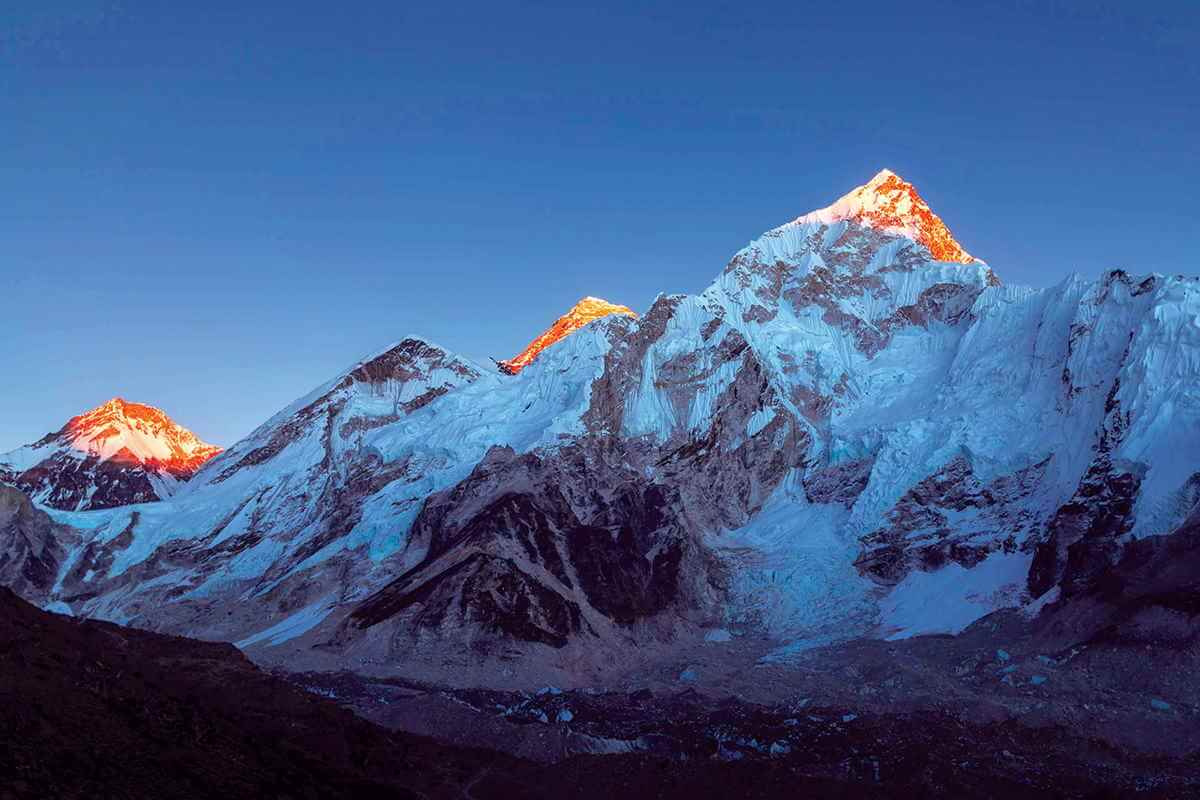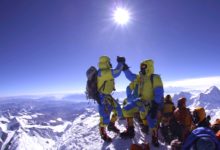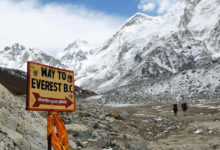Ema Dantas: “Our mental health controls every fiber of our physical health.”
This week, Manuel DaCosta had the opportunity to interview an amazing woman, Ema Dantas, for Here’s The Thing (Camões TV). Ema Dantas is the President and CEO of Language Market Plan, International Translation Experts, and the founder of Peaks for Change, a foundation that brings awareness to mental health issues and intends to end the stigma.
Being mental health awareness week, we couldn’t miss the opportunity to talk with Ema which has been doing an amazing work in this field. Peaks for Change has been supporting CAMH and other organizations, raising funds and supporting the community. Moreover, Ema has taken on a personal mission to climb the seven summits to raise awareness for mental health. She just got back from her journey on Nepal on the attempt to climb Mount Everest. Ema Dantas has showed us what strength and determination are, and most importantly, the importance of staying true to ourselves.
 Manuel DaCosta: Everest was your seventh attempt at the highest peak, this time it didn’t worked out but there will be more opportunities in the future. You abandoned the project for health reasons. Could you explain to us, what have you felt in that mountain?
Manuel DaCosta: Everest was your seventh attempt at the highest peak, this time it didn’t worked out but there will be more opportunities in the future. You abandoned the project for health reasons. Could you explain to us, what have you felt in that mountain?
Ema Dantas: I started to feel bad when I arrived at Namche, which is the first stop in the Khumbu trek that you can do walking to basecamp. Usually if you are climbing the south, which I was, you do the trek by foot and it helps with the climatization. It’s also not a very clean place and a lot of people get sick. That had been one of my biggest fears since day one and why I always had the intention of going through the north side, which is the Tibet side. Last year, Tibet was closed and this year it also didn’t open to foreigners, they only opened to 40 Chinese individuals.
I started to get sick on the second day. I was throwing up so much to the point where throughout the trek, there are public bathrooms, the guiding company kept making sure that I had a bathroom in my own room… that is how sick I was.
MDC: Was there adequate medical help?
ED: It was adequate, but it was not enough. The guides did the best they could, I had my own antibiotics that we have to take with us, and I took them all and nothing help. I kept going all the way to basecamp. We were in the basecamp more time than what we had anticipated on the schedule because there was a couple of avalanches that fell on the Khumbu icefalls, so we couldn’t go. We had to let the route to be rerouted. I just kept feeling weaker and weaker. There was hardly anything that I could keep up. I started to drink a lot of seven up and for some reason, that was the only thing I could keep down.
In order to climb, you have to be at 100%. When you are trying to do something, but you know that you are no longer at that 100%, but at 50 or 60, and you are trying to complete something where you are not only putting your life at risk, then you start thinking that you will put someone else’s life at risk.
MDC: Exactly. You have to think about your group. You are there to support and help each other.
ED: And not only the team, but also the guides, the Sherpas, even though there were so many conceptions and they had made contingency plans. They made plans for me, they sat down with me and were discussing what we could do. The Sherpas could take my backpack, but my issue was not my backpack, that had 14 pounds, because I trained with 60, my issue was that I had needed to go to the bathroom every half an hour and, on the Khumbu Icefalls, I couldn’t take my harness off. On the first day that we were going to camp one, I was so sick that we made the decision to return to basecamp so I could rest and see if I would get better. I saw how much the guide and the Sherpa did to bring me back safely and then I started to think, how can I repeat this six times, because we have to for climatization, for the summit. How can I do this safely not only for me but also for the Sherpas and the guide? I was so weak. I climbed every other mountain and I never felt this way. I would take a step and it was so hard to take. From my tent to the dining tent, to the bathroom, to the tent, it was hard to walk.
MDC: Most of us, that know you, we understand that you are not a common woman. There are only a few people that have come to do what you have done since 2017. When I read the phrase where you said, “I cried within the walls of my tent”, I had this vision of you being in that tent and the walls closing around you. You saying to yourself I have to make this decision, regardless of how hard it is. Tells us more about how much strength it took for you to make that decision.
ED: I don’t know if I’m uncommon Manuel, but I know that it was so important to me to finish Everest. I spent two days thinking about it, still hoping, I was taking 12 hours at a time. Then I thought I can’t do it because I’m in no physical condition and I did want to come back home because Everest is dangerous. When you can’t comprehend there is an avalanche coming at you and you are so out of it, and with the altitude… I started crying because I thought I was letting everyone down. I started messaging the kids and I said I can’t do this, they messaged me back saying that I could, that I trained so hard. At that moment I thought, it’s not that I can’t do it physically or that I don’t want to. I’m so ill that I can’t do it, because of mental health I started thinking… we always think we have to pretend that we are happy and that we have to make up things. I thought to myself, it would be really hypocritical of me trying to pretend that I can go and do something that I really can’t. The past 20 days had made me so weak, that I could no longer do what I could do at home. The only way was to tell the truth. If you read what I wrote on Facebook it was what happened. One day we were training, seeing how the ropes were and getting acquaintance and I literally lost control of myself, of my bowel movements, as a child would. I’m 53 years old and that was embarrassing.
MDC: One of the reasons that I said you are an uncommon woman is because you are actually not comfortable with heights. Mentalizing yourself to the point where you climbed all of these peaks… that’s not a normal person.
ED: Maybe not (laughs). I did want to try, to the point that even when I had the “accident”, the guides contacted the basecamp, by radio, so they would have the shower ready for me and I thought ok, I can still do this, there’s no shame. However, when I was going up, my body was just saying ‘No’ and we had a small avalanche happen and that’s when I went back to my tent and I cried. I started to think that I didn’t process that cloud even though I was under it. I was hearing on the radio another guide telling us to duck because it was coming at us. When you are not feeling well and you can’t be 100% on the mountain it becomes a liability and so many people have died, especially in the Khumbu Icefall and that was one of my biggest fears. I thought, if I couldn’t perceive that as dangerous, how would I be able to continue going and not misplace a foot and slip and even though I was tied to a rope, then I would be putting other people in danger for trying to take me out of a crevasse.
MDC: While you were there, did you ever ask yourself if you were mental and physical prepared for this climb?
ED: When I got there and when I left, I was 100%. The first two days in Namche, that we had climatization, I thought it was awesome, the greatest place. Only at the end of the second day I started to feel bad, and the guide was saying for me not to worry and that usually happens at the beginning. Then the days were coming and going, and I was still not feeling better and started to throw up in the middle of the hike.
MDC: You were prepared but not for the medical issues that came along with it, as nobody ever is. What does it take to prepare to climb Everest?
ED: It ended up being two years where basically I trained every single day, I did weights, I hiked on weekends with 60 pounds on my back, I did that for five to six hours. This winter, I did a lot of snowshoeing, I would run during the day for cardio. Mentally, I also prepared that I would have to be two months away from family, you don’t have books or movies to watch, you have comfy food that you take, you have comfy clothes and a comfy pair of boots. This is all part of getting there. Unlike other mountains where I would get really anxious about them, I don’t know why, but I wasn’t anxious about Everest. I knew that I had a really good team, in my head this would have been my last mountain. I knew that after 21,000 feet it was, more or less, like Aconcagua and I knew that was fine, that we would get oxygen, I was totally comfortable with that.
When I was training for Carstensz Pyramid, which was my first one, I had broken three ribs. I trained all day with three broken ribs and I never had a problem. To be honest, an illness never crossed my mind. I had been ill in Russia, in Elbrus, for two or three days, because everybody gets stomach problems and I still made it up with 50km winds. It never occurred to me that I would be at the bottom of the Khumbu Icefall training and that I would be subjected to losing control of my abilities to control my body functions.
MDC: In your post you mentioned Jesus, how much did you appeal to him during this time?
ED: I begged him! I know everybody has their own beliefs, but climbing for the last three years, I have found that He has always been with me. Only if you are there and feeling the things… In Aconcagua there’s one little narrow path that you walk, and we had been training bellow how to do it because there’s always high winds. I started to fear it because of my fear of heights. I remember starting to get to that section and talking to myself, having a conversation with Jesus ‘ok, this is what we are going to do today’. To be honest, the winds stopped, and the guides were saying how weird that was no wind that day. Then I was thinking, He’s over here, He got my back.
I had begged him so much to guide me through the Khumbu Icefall, to make me feel better. We had a big talk, when I was putting my crampons on my backpack, that I was good, I was not to go to the bathroom until camp one (laughs) and it didn’t work out that way. I felt that I was cold, that there was something dark, I don’t know how to explain it without just saying how I felt… It was a darkness of a place that I felt in the Khumbu Icefalls. If you go back and read a lot of stories about hiking, that is where all the deaths occurred, and I felt there was a darkness and a sadness on that place.
MDC: As I told you, you inspired me to climbing mountains. There’s no shame to fail, to cry or to say that I can’t. I look at your next step as saying that you can and that you will, maybe from the other side.
ED: When I was leaving, I was like ‘ok, to that side here we come’. Even my daughter, that is getting married next year, she was like ‘you can go next year through the Tibet side, my wedding is just at the end of June, you are still back in time’ (laughs).
It is an amazing mountain and an amazing place. This year, because of Covid-19, it does have a lot of issues. After my post, a gentleman named Robert Anderson, he has done all the seven summits and has a couple of books written, messaged me and said ‘you made the right decision for various reasons’. It made me feel that ok, I can get sick, Robert has attempted various times to rock climb Everest, even without oxygen, and many times he has turned around.
MDC: This is Mental Health week, what should be people reflecting on?
ED: I think that if people just take what I’ve gone through, sometimes we feel down, humiliated, feeling like we are letting people down and feeling that you can’t leave your tent because you are crying and you know that everyone around is hearing you crying in your tent. Maybe we can all reflect that is not always important what other people think. It’s not always important how other people are going to judge us. It’s more important what we think of ourselves. Everything that we do, even if we don’t succeed, is a lesson learned and never a failure.
I learned that I may have stomach problems, so maybe next time I need to address them differently, be more prepared. If we are going to learn anything on Mental Health week and if you are going to learn from my example, is that we should be open with each other and that is how we are going to end the stigma. By being honest about our lives, about how we do things and our feelings, at the end it makes us feel better, because we are just human. We are all human. We feel, we cry, it’s not just a very pretty social media Instagram account where only good things happen. We all have prob0lems, we all have bad days, we all cry, we all suffer, and we all need caring. We all get sick, and we all get well.
MDC: A lot of people are Mental Health deniers and live with this stigma. What would you say to someone like that, to bring them out of their shell?
ED: For almost 20 years, I saw my mom not getting out of the couch and not because she didn’t have the will to smile. I would say, just go and look at my Facebook page and see what I went through. There is nothing to be ashamed of…
MDC: I read it and it inspired me, seeing the honesty of your words. That’s what people should take from that. This is not about failure, it’s about a lesson in life.
ED: That is what we all have to think about with Mental Health. To be honest, the last few days, I cried a lot on my couch and there are days where I’m still so tired that is hard for me to get up, maybe because I’m in lockdown, maybe because of the travel. I can’t leave the house which is making me feel trapped. Then, at the same time, I know I have to get out of the couch because I did nothing wrong. We all need to take a breath and just say “ok, this is what happened, I have learned this lesson”. I know it’s hard, with every tear we can also see the possibilities, if we wipe our tears off, and see what lesson we have learned. We can just feel a little better.
MDC: The foundation Peaks for Change will continue to raise money. CAMH, your part way, is on their way to raise 700,000 dollars. What are the short-term plans to continue the campaign?
ED: Our short-term plans were to finish the seven summits and I have to talk to the Board if we are going to consider them complete, because it’s not always about the summit. With Peaks for Change we want to continue working with the community, especially the elderly and the younger community that are suffering with mental health issues. The goal is still to continue emphasizing that we have to end the stigma. We have to get out of that shell that mental health is not important or doesn’t exist. Our mental health controls every fiber of our physical health.









Redes Sociais - Comentários